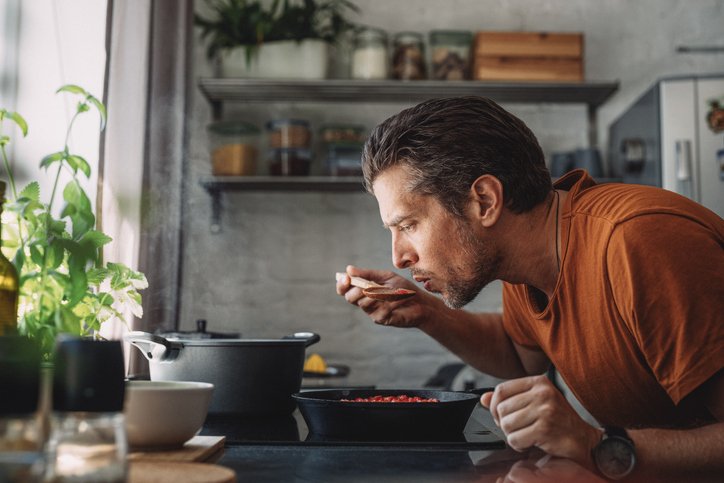
With so many diets being promoted in popular culture today, nutritionists are tasked with guiding clients in finding the right approach to food, wellness and health. Intuitive eating takes an opposite approach to traditional diets and aims to give the individual greater control over their food choices and hunger (Jennings, 2019).
Intuitive eating is a framework of eating that was developed by dieticians Elyse Resch and Evelyn Tribole in 1995. Since then, it has been used as an evidence-based model that acknowledges the importance of instinct, emotion and self-care in eating (Tribole, 2019). Above all, it rejects imposed guidelines about what one should or should not eat and gives the individual the power to choose (Jennings, 2019). If you’re training for a career as a nutritionist, read on to find out why intuitive eating could be the right choice for your clients.
Teach Clients to Tune Into Their Bodies
First and foremost, Intuitive Eating encourages individuals to make food choices that feel good for themselves and their bodies, rather than following general rules and restrictions (Stokes, 2019). Instead, the practice shifts our attention to the internal cues of our body: hunger and satiety signals, taste preferences, energy levels and what feels good (Stokes, 2019). In simple terms, eat when you are hungry and notice when you are full.
The notion of tuning into our bodies is one that goes back to our primal instinct. The idea is that our bodies do not like to exist in a state of hunger, which often leads to intense cravings, an increased chance of bingeing and feeling out of control around food (Schram, 2021). By encouraging individuals to respect their hunger and attend to it when needed, Intuitive Eating becomes a practice of empowerment (Schram, 2021).

Challenging Popular Beliefs Around Food
As a graduate of nutritionist school, it is important to note the contradictory claims surrounding many popular diets and the challenges that people face in sticking to them. Research suggests that 97% of dieters regain everything they lost within three years. At the same time, dieting can lead to negative health effects that include food and body preoccupation, weight stigma, eating disorders and lower self-esteem (Rachel Hartley Nutrition, 2021).
For that reason, Intuitive Eating is a practice that rejects diet culture and the diet mentality. Many diets are quick to categorize foods into “healthy” or “unhealthy” and attach a moral virtue to them (Stokes, 2019). By contrast, Intuitive Eating removes the notion of foods as “good” or “bad,” along with the sense that we are “good” or “bad” based on our food choices (Stokes, 2019). The individual is free to find pleasure in eating enjoyable food and making the right choices for their body.

Take a Holistic Approach to Health and Wellness With Nutritionist School
A big part of Intuitive Eating takes into account the physical and emotional wellbeing of the individual. It brings awareness to the fact that emotional eating is a strategy for coping with feelings and encourages people to differentiate between real hunger and hunger based on emotion (Jennings, 2019). In those instances, physical exercise, taking a mental break or speaking to friends can be a better method of coping with one’s emotions. Physical activity is another important part of Intuitive Eating that encourages the individual to find satisfaction in moving their body, rather than being motivated by weight loss (Rachel Hartley Nutrition, 2019).
As a student in the nutritionist program at Rhodes Wellness College, you will take a holistic approach to the study of nutrition that integrates the client’s emotional, mental, physical and spiritual wellbeing. By broadening your understanding of what constitutes nutrition, you can assist clients in making intuitive food choices to benefit their overall health.
Are you looking to start your career with a nutritionist college?
Contact Rhodes Wellness College for more information.
Works Cited
Stokes, A. (2019). Intuitive Eating: Principles, Challenges And Important Considerations. JM Nutrition. Retrieved March 2, 2022, from https://www.julienutrition.com/intuitive-eating-principles-challenges-considerations/
Tribole, E. (2018). What is Intuitive Eating? The Original Intuitive Eating Pros. Retrieved March 2, 2022, from https://www.intuitiveeating.org/what-is-intuitive-eating-tribole/
Jennings, K. (2019). A Quick Guide to Intuitive Eating. Healthline. Retrieved March 2, 2022, from https://www.healthline.com/nutrition/quick-guide-intuitive-eating
Schram, A. (2021). The Beginner’s Guide to Intuitive Eating. Kara Lydon Nutrition. Retrieved March 2, 2022, from https://karalydon.com/health-wellness/beginners-guide-intuitive-eating/
Rachel Hartley Nutrition (2022). What is Intuitive Eating? Beginners Guide to the Intuitive Eating Principles. Retrieved March 2, 2022, from https://www.rachaelhartleynutrition.com/blog/intuitive-eating-101-beginners-guide-to-intuitive-eating









